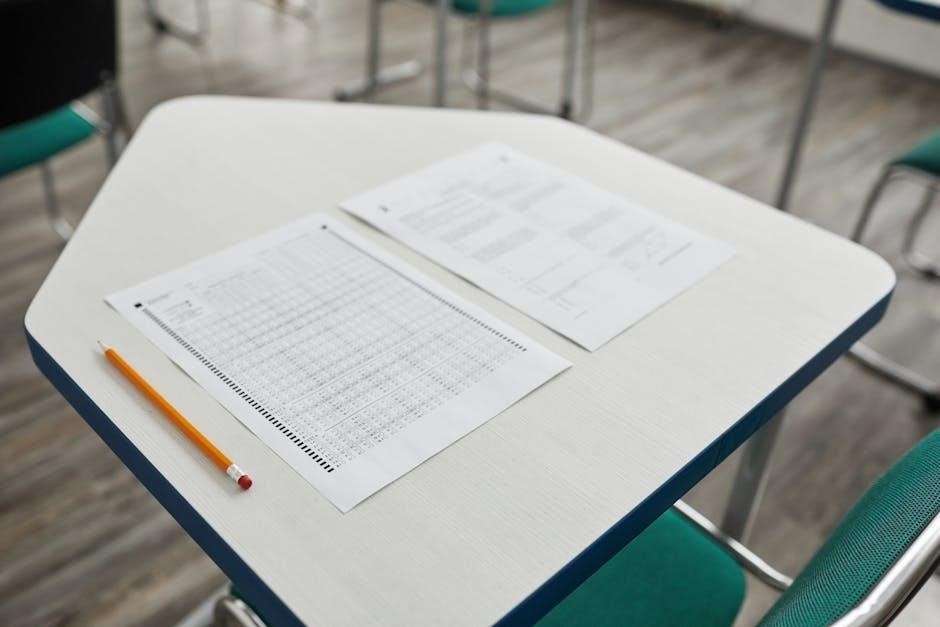The PA Notary Public Test is a critical exam for aspiring notaries, assessing knowledge of notarial laws, protocols, and procedures․ Access practice tests with verified answers in PDF format to prepare effectively, ensuring readiness for the exam․
Overview of the Exam Structure
The PA Notary Public Test consists of multiple-choice questions designed to evaluate knowledge of notarial laws, protocols, and procedures․ The exam focuses on topics like RULONA, notary fees, and stamp requirements, with a time limit for completion․ Practice tests with verified answers, available in PDF format, mirror the actual exam structure, helping candidates familiarize themselves with the format and content․ These resources include 30 questions covering essential areas, ensuring thorough preparation for the exam․
Importance of Preparation
Thorough preparation is essential for success on the PA Notary Public Test․ Utilizing practice tests with verified answers helps candidates master notarial laws, protocols, and procedures․ These resources, often available in PDF format, provide insights into exam content, such as RULONA, notary fees, and stamp requirements․ By studying these materials, individuals can identify knowledge gaps, improve retention, and build confidence․ Effective preparation ensures readiness to pass the exam on the first attempt and perform notary duties competently․

Eligibility Criteria for Becoming a PA Notary Public
Becoming a PA Notary Public requires meeting specific eligibility criteria․ Candidates must be at least 18 years old, reside or work in Pennsylvania, and be U․S․ citizens or permanent residents․ They must also read and write English proficiently and pass the required exam․ Additionally, applicants need to complete a bond, oath of office, and commission within the specified timeframe․ Meeting these criteria ensures individuals are qualified to perform notarial duties responsibly and legally within the state․
Minimum Age Requirement
The minimum age to become a PA Notary Public is 18 years old․ This requirement ensures that applicants are legally recognized as adults and capable of assuming the responsibilities associated with the role․ Meeting this criterion is essential for eligibility, as individuals under 18 cannot apply or perform notarial duties․ This age requirement aligns with other legal responsibilities and is a foundational step in the process of becoming a notary in Pennsylvania․
Residency and Work Requirements
To qualify as a PA Notary Public, applicants must either reside in Pennsylvania or work in the state․ This ensures a strong connection to the jurisdiction they will serve․ Residency or employment within PA is mandated to maintain accountability and familiarity with state-specific notarial laws․ Meeting this requirement is crucial for eligibility, as it directly ties to the notary’s ability to perform duties effectively within Pennsylvania’s legal framework․ This criterion is strictly enforced to uphold the integrity of notarial services in the state․
Citizenship and Language Proficiency
To become a PA Notary Public, applicants must be U․S․ citizens or permanent residents and demonstrate proficiency in reading and writing English․ This ensures they can understand and execute notarial duties accurately․ Language proficiency is critical for maintaining the integrity of notarizations, as clear communication is essential․ Applicants must meet these criteria to qualify for the exam and perform their responsibilities effectively․ This requirement aligns with the state’s commitment to upholding legal standards and ensuring public trust in notarial services․

Key Topics Covered in the PA Notary Public Exam
The exam focuses on RULONA, notary protocols, fees, and stamp requirements, ensuring candidates understand laws, procedures, and ethical practices essential for performing notarial duties accurately․
RULONA (Revised Uniform Law on Notarial Acts)
RULONA establishes standardized rules for notarial acts, including document authentication and electronic notarizations․ It covers duties like verifying identities, maintaining records, and ensuring ethical practices․ Understanding RULONA is crucial for the exam, as it forms the legal foundation of notary responsibilities․ Practice questions and study materials, such as PDF guides, often focus on RULONA to help candidates master these principles․ This knowledge ensures notaries perform their duties accurately and in compliance with Pennsylvania state laws․
Notary Protocols and Procedures
Notary protocols and procedures involve standardized steps for executing notarial acts, such as verifying identities, witnessing signatures, and completing documentation․ These practices ensure legal compliance and accuracy․ Key areas include proper handling of documents, maintaining journals, and adhering to ethical standards․ The exam tests knowledge of these processes, such as verifying identities, handling electronic documents, and using appropriate notary tools․ Study materials, like PDF guides, provide sample questions and detailed explanations to help master these essential procedures and ensure exam readiness․
Fees and Charges for Notary Services
Fees for notary services in Pennsylvania are regulated by state law, ensuring transparency and fairness․ Notaries may charge a maximum of $5 per notarial act, such as acknowledgments or oaths․ Additional fees may apply for travel or specialized services, but these must be agreed upon in advance․ The exam tests understanding of these fee structures and ethical pricing practices․ Study materials, including PDF guides, provide detailed insights and practice questions to help candidates master this critical aspect of notary services․
Stamp and Seal Requirements
In Pennsylvania, notaries must use an official stamp and seal to authenticate documents․ The stamp must include the notary’s name, commission number, and “Notary Public” title․ The seal must be photographically reproducible and used on all notarized documents․ Proper use of these tools is critical, as they verify the authenticity of notarial acts․ Exam questions often address these requirements, ensuring notaries understand their importance․ Study materials, such as PDF guides, provide detailed information on stamp and seal specifications to help candidates prepare effectively for the exam․
Practice Questions and Answers
Access PA Notary Public practice tests with verified answers in PDF format to prepare for the exam․ These resources cover key topics and ensure effective preparation․
Common Exam Questions
Common PA Notary Public exam questions focus on RULONA, notary protocols, fees, and stamp requirements․ Questions often cover the primary responsibilities of notaries, such as administering oaths and affirmations, verifying identities, and ensuring document authenticity․ Additionally, exams may include questions about the maximum time to record bonds, oaths, and commissions, as well as residency and eligibility criteria․ Practice tests with verified answers help candidates familiarize themselves with these topics and improve their understanding of Pennsylvania notary laws and procedures․
Verified Answers and Explanations
Verified answers and explanations are essential for understanding correct responses to PA Notary Public exam questions․ These resources provide detailed reasoning behind each answer, helping candidates grasp key concepts like RULONA, notary protocols, and legal procedures․ By reviewing explanations, aspiring notaries can identify knowledge gaps and improve their comprehension of critical topics․ This ensures they are well-prepared for the exam and understand the practical application of notarial laws and responsibilities․
Test Preparation Resources
Access study guides, online practice tests, and video tutorials to prepare for the PA Notary Public exam․ Resources include PDF downloads with verified answers and explanations․
Study Guides and Manuals
Comprehensive study guides and manuals are essential for preparing for the PA Notary Public exam․ These resources include detailed explanations of RULONA, notary protocols, and practice questions․ Available in both print and digital formats, they provide in-depth coverage of exam topics, such as fees, stamp requirements, and procedural best practices․ Many guides also offer sample exams and flashcards to aid memorization․ Additionally, video tutorials and RULONA test preparation materials are available to enhance understanding․ Utilizing these tools ensures thorough preparation and confidence for the exam․

Online Practice Tests
Online practice tests are a valuable resource for preparing for the PA Notary Public exam․ These tests simulate real exam conditions, helping candidates assess their readiness․ Many platforms offer practice tests with verified answers, allowing users to track progress and identify weak areas․ Resources like Docsity provide downloadable PDFs with exam questions and answers, while websites offer interactive tests․ These tools focus on key topics such as RULONA, notary protocols, and fees․ Regular practice with these tests ensures familiarity with the exam format and improves problem-solving skills․
Flashcards for Memorization
Flashcards are an excellent tool for memorizing key terms and concepts for the PA Notary Public exam․ Platforms like Quizlet offer digital flashcards covering essential topics such as RULONA, notary protocols, and fees․ These flashcards are designed to help candidates memorize definitions, procedures, and legal requirements․ By focusing on specific terms and concepts, flashcards enhance retention and understanding․ They are particularly useful for studying on-the-go, allowing candidates to review material efficiently and reinforce their knowledge of notary public responsibilities and ethics․

Exam Format and Timing
The PA Notary Public exam typically consists of 30 multiple-choice questions․ Candidates are given 60 minutes to complete the test․ Time management is crucial for success․
Number of Questions and Time Limit
The PA Notary Public Test features 30 multiple-choice questions, and candidates are allotted 60 minutes to complete the exam․ Proper time management is essential to ensure all questions are answered thoroughly․ Practicing with sample tests in PDF format can help candidates familiarize themselves with the format and timing, allowing them to allocate their time wisely during the actual exam․ This preparation is key to achieving a successful outcome․
Additional Study Materials
Enhance your preparation with PDF guides, flashcards, and video tutorials․ These resources provide in-depth insights and practice questions, ensuring comprehensive understanding of notary protocols and RULONA․
PDF Resources and Downloads
Downloadable PDF resources, such as practice tests and study guides, are widely available for PA Notary Public exam preparation․ These materials include verified answers, sample questions, and detailed explanations to help candidates master notarial laws and protocols․ Websites like Docsity offer PDFs with 30-question practice exams, focusing on RULONA, notary procedures, and fee structures․ Additionally, the Pennsylvania Notary Association provides PDF guides that cover essential topics like stamp requirements and ethical practices․ These resources are ideal for self-study and ensure thorough preparation for the exam․
Video Tutorials and Webinars
Video tutorials and webinars are excellent resources for preparing for the PA Notary Public Test․ The Pennsylvania Notary Association offers a RULONA Test Preparation video, which reviews the Revised Uniform Law on Notarial Acts․ These visual aids provide in-depth explanations of key concepts, such as notary protocols, fees, and stamp requirements․ Webinars often include interactive Q&A sessions and sample exam questions, helping candidates understand complex topics․ They are particularly useful for visual learners, offering a comprehensive understanding of the material needed to pass the exam with confidence․

Final Tips for Success
Success on the PA Notary Public Test requires consistent practice with sample questions, thorough understanding of RULONA, effective time management, and careful attention to detail to avoid common mistakes․

Time Management Strategies
Effective time management is crucial for success on the PA Notary Public Test․ Allocate equal time to each question, avoiding spending too long on a single query․ Practice with timed mock exams to build speed and confidence․ Prioritize questions covering RULONA, notary protocols, and fee structures, as these are frequently tested․ Review verified answers to understand common pitfalls and optimize your study schedule․ Use flashcards to memorize key terms quickly, ensuring efficient preparation․ Employ these strategies to enhance your performance and complete the exam within the allotted time frame successfully․
Avoiding Common Mistakes
To excel on the PA Notary Public Test, avoid common errors such as misinterpreting RULONA principles or miscalculating notary fees․ Many candidates overlook the importance of understanding document stamp and seal requirements, leading to incorrect answers․ Additionally, rushing through questions without thoroughly reading them is a frequent mistake․ To prevent these issues, thoroughly study notary protocols, practice with timed exams, and review verified answers to identify and correct weak areas․ Regularly test your knowledge using flashcards and focus on understanding key terms to minimize errors during the exam․
